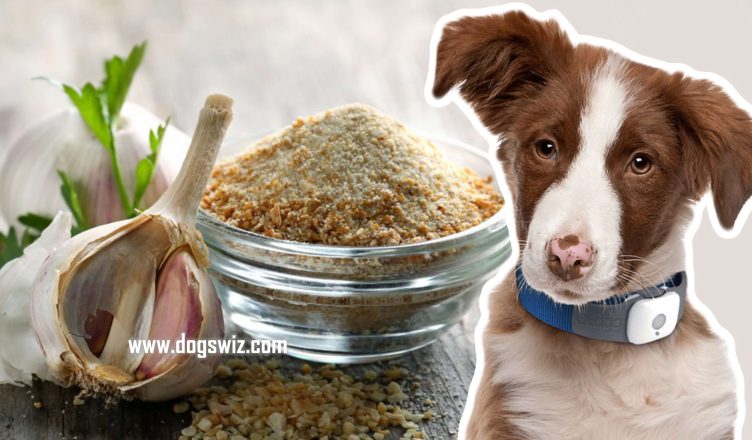Garlic seasoning is one of the most common ingredients in many dishes. It has a strong, pungent, and spicy taste that dogs love. However, some people are concerned about the effect this ingredient has on their pets’ health. This article will answer all you need to know about the question ‘Can dogs eat garlic seasoning?’
Let’s get started!
In small quantities, garlic can be safe for dogs, although giving large amounts of garlic to your furry friend should be avoided. This applies to most forms of garlic, seasoning included. Adding garlic seasoning to food once in a while will not do any harm. However, we recommend that you do not regularly offer your dog garlic-seasoned food. All dogs are individuals, so they may have different reactions to eating garlic. Some may not even like the smell of garlic seasoning, which can make it a bit more difficult to eat.
Garlic Toxicity In Dogs
Garlic, in large amounts, is toxic to dogs. It contains a compound called thiosulfate, which is harmful to them. Eating large amounts of thiosulfate can lead to hemolytic anemia, which can cause serious illness and even death in some cases. Hemolytic anemia is a condition where the red blood cells in the body are destroyed faster than the formation of new red blood cells in the spleen.
The toxic compound in garlic, thiosulfate, reacts with the dog’s red blood cells. The red blood cells are destroyed and fewer new ones are being made. This lowers the production of hemoglobin, which is a protein that carries oxygen from the lungs to all parts of the body. If not treated quickly, hemolysis can lead to shock, organ failure, and death in severe cases.
Symptoms of Garlic Toxicity
The symptoms of garlic toxicity in dogs can vary. The most noticeable symptoms of garlic toxicity in dogs include:
- Increased thirst and urination
- Vomiting and diarrhea
- Weakness, lethargy
- Loss of appetite
- Abdominal pain
- Depression
- Dehydration
- Liver Failure
In extreme cases, dogs can also suffer from hemolytic anemia. Hemolytic anemia is a condition where the red blood cells are destroyed faster than they can be formed in the dog’s spleen, which can be lethal for dogs. Symptoms of hemolytic anemia include:
- Pale mucous membranes
- Rapid breathing
- Lethargy
- Weakness
- Jaundice
- Dark-colored urine
If you think your dog has consumed a large amount of garlic, you should immediately take them to the vet. The sooner a diagnosis can be made, the more effective treatment might be.
How Much Garlic Can My Dog Eat?
The amount of garlic you can give your canine mainly depends on their weight and age. It is cautioned that puppies and older dogs should not be fed any garlic at all. Generally, it would be wise to not feed any garlic, even to an adult dog, but if the dog insists on eating garlic, feed it in moderation. To calculate the amount of garlic your dog can eat, just use this rule of thumb:
- Small Breed Dogs: 1/4 – 1/2 tsp of garlic powder or one to three small cloves of garlic.
- Medium Breed Dogs: 3/4 – 1 tsp of garlic powder or four to five small cloves.
- Large Breed Dogs: 1-1.5 tsp of garlic powder or six to seven small cloves.
If your dog is taking pills, you should also ask the vet if they can have garlic. Moreover, if your dog is pregnant or has any underlying health conditions, do not feed them any garlic. If you notice that your pet had diarrhea or vomiting after it has eaten garlic, do not give it again. Call your vet immediately and explain the situation in brief.
Can Dogs Eat Garlic Seasoning?
Yes, dogs can eat garlic seasoning, but only in moderation. Garlic seasoning contains a small amount of garlic powder and a few brown spices. Compared to the amount of garlic that is toxic to dogs, a little bit of seasoning will do little harm. However, it is still best not to encourage your dog to eat garlic regularly as some dogs can be more sensitive to it than others.
Furthermore, the seasoning might contain a more concentrated amount of garlic compared to standard garlic, so you should exercise caution. Additionally, eating the extra salt in the seasoning can also be harmful to dogs. Extra salt for your dog could mean possible health issues such as dehydration, high blood pressure, salt poisoning, and even death in rare cases.
Also, if your dog is not used to the flavor of garlic, there is a good chance they will not eat seasoning containing garlic.
If your dog accidentally eats a large amount of the seasoning or feels sick after eating any amount of garlic seasoning, we recommend you call the vet immediately. Avoid feeding any additional garlic or garlic product to your dog if you notice him/her throwing up.
Thank you for reading the article.
Here are all of our garlic-related articles.
Have you ever added garlic seasoning to any of your pup’s food? Did they love the taste? We would love to hear from you. Please share your experience in the comment section below.
